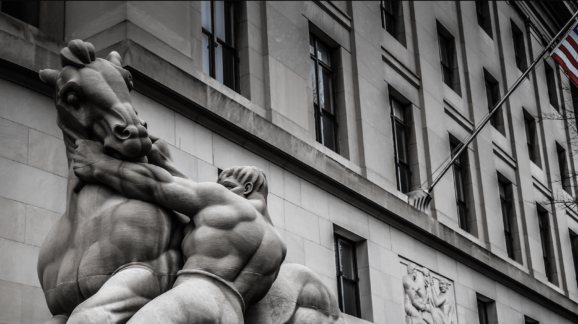America last? How the antitrust agencies could jeopardize both big and small business

Photo Credit: Getty
At a time when trade deficits, particularly with China, are a major economic and political concern for the Trump administration, the antitrust authorities are actively pursuing actions that would undermine American companies’ global competitiveness.
The final week of the remedy phase in the Justice Department’s antitrust case against Google Search is underway. The Department of Justice (DOJ) won its suit back in August 2024 (not to be confused with the April 2025 decision against Google’s ad-tech) and is urging the federal court to force Google to divest its search engine, Chrome.
Additionally, the Federal Trade Commission (FTC) is presently litigating its antitrust suit against Meta for its acquisitions of Instagram and WhatsApp, two purchases that occurred over a decade ago. The Commission is likewise pushing for the divestiture of those two companies.
The Trump administration’s “America First” priorities include American companies dominating on the global stage. The president has lambasted the purported trade imbalances with Asian and European countries. But the antitrust agencies’ goals seem bewilderingly counterproductive to the America First agenda.
Chrome’s global success is undeniable — even in Asia, with a market share exceeding 70 percent across the continent. Chrome’s prevalence in Asia provides Google, and by extension the US, with a significant digital footprint in a strategically advantageous part of the world.
Even President Trump seems to harbor doubts about breaking up Google. When asked if Google should be broken up at an October 2024 event hosted by Bloomberg News and The Economic Club of Chicago, President Donald Trump said, “It’s a very dangerous thing, because we want to have great companies. We don’t want China to have these companies. Right now, China is afraid of Google.”
For a Google breakup to be successful, the government must find a suitable buyer for Chrome. That buyer would need enough capital and technical expertise to maintain the Chrome browser at its current scale. If Chrome is weakened through forced divestiture, the opportunity for a foreign competitor to rise and seize market share grows significantly. Imagine a scenario where a Chinese tech company, flush with capital and driven by national strategic goals, aggressively targets the Asian market.
Then, there is Meta’s WhatsApp, a messaging app that is overwhelmingly more popular overseas than it is in the US. WhatsApp’s penetration in the US among chat app users is only 41 percent. Compare that to the ten countries that have penetration rates over 90 percent: Brazil (98 percent); India (97 percent); Italy (97 percent); Argentina (96 percent); Switzerland (95 percent); Finland (95 percent); Germany (95 percent); Austria (94 percent); Netherlands (92 percent); and Spain (92 percent). Mexico, Indonesia, and Russia have rates over 80 percent as well.
WhatsApp’s usership is now six times larger than it was when Meta acquired the messaging app in February 2014. Instagram’s usership also skyrocketed after being purchased in 2012, a move that was initially mocked on cable news shows. India has more Instagram users than the US has people. Antitrust regulators attribute these successes to nefariousness, rather than the business acumen at Meta.
The antitrust suits pose a threat to both Google and Meta’s advertising businesses, ones that small businesses have benefited from. “Businesses have more advertising options than ever,” according to Beth Egan, Associate Professor of Advertising at Syracuse University. Speaking on the DOJ’s ad-tech case against Google, she said Google “offers convenient, cost-effective advertising tools that millions of small businesses use to find customers, grow and succeed.” Egan notes the fierce competition between Google and Meta and that ad prices are falling and becoming more effective.
The success of the Trump administration’s trade deals would significantly amplify the role of online advertising services. And conveniently, American tech companies have a strong foothold in overseas markets where they can connect US businesses to buyers abroad. That might not happen if the DOJ and FTC are successful in breaking up the tech companies’ integrated advertising ecosystems.
Some are unpersuaded by the argument that overzealous antitrust enforcement and extreme structural remedies hinder American companies’ competitiveness abroad. The newest appointment to the FTC, Commissioner Mark Meador, argued as much in a recent speech given at the Second Annual Antitrust Conference at George Washington University. Meador seemingly doesn’t consider structural remedies to be a form of central planning. He suggests the opposite. The absence of such remedies constitutes central planning. If you’re scratching your head, you’re not alone.
In his speech, the Commissioner attempted to bust what he sees as six myths that have proliferated in American antitrust. One involves what he calls the national champion model, “that antitrust enforcement threatens America’s global position — that weakening our biggest companies would hand the future to China.” Meador is correct that we should not embrace protectionism (tariffs anyone?). But his contention is diametrically opposed to President Trump’s stance on a potential breakup of Google and the opportunity it would provide to China.